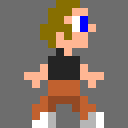
A note about Gravitation
|
In November of 2007, I showed Passage at the GAMMA256 event in Montreal. On my way back to Potsdam the next day, I telephoned my spouse and learned that our close friend (age 87) was effectively brain dead in the hospital and her son (my best friend in town) was agonizing over whether to remove life support.
As soon as I got home, I headed to the hospital to help my friend with his deliberations. Over the next few days, I logged countless hours in the intensive care ward. We thumbed through books on neurobiology. We performed various experiments to detect brain activity and reflexes. We talked to (and fended off) the nurses and his mother's doctor. We conversed endlessly about life, death, love, and regret in the hospital lounge. During one of these conversations, my friend gave an appropriate name to a particular feeling that I have been having from time to time throughout my life. That feeling was part of what I was trying to express with Passage. My friend called it "existential terror." We talked quite a bit about what parents tell children to ward off death terror. My parents told me, "Yes, you will die, but hopefully a long time from now, so don't worry about it." The "long time from now" bit doesn't work forever, unfortunately, and I seemed to be feeling that pinch acutely as I turned 30. My desire to create Passage was driven by that pinch, and it served well as an emotional outlet. Of course, that's not all that I was trying to express with Passage---also an appreciation of life's profound beauty, of which death is a central component. Combine the two together and you get "terrible beauty," which hits the feeling pretty squarely. Between hospital visits, I found myself gradually inundated with email. Lots of people were playing Passage, and they seemed to like it. The irony was palpable: Here was my friend, nursing his brain-dead mother in the hospital, while my little 5-minute death game was climbing the charts. I was excited by the success of my work, but simultaneously perplexed by the timing. Regardless, all of these life-changing events, hitting me at once, elevated my mood to the point of near mania, and I drank deeply of the conglomerate experience. My friend eventually removed life support, and his mother eventually died. I, on the other hand, found myself more and more swamped by the success of Passage, to the point where I was spending most of my time dealing with publicity and very little time contemplating what I should work on next. As the first publicity swell passed, I found myself questioning the point of my work, and my mood darkened significantly. I also stared regretfully at the stack of ideas and leads that had piled up during my near-mania, not to mention the pile of back-burner projects that had accumulated over the years. Perhaps at the emotional low-point of this cycle, I decided that I shouldn't waste any more time dealing with Passage inquiries. I needed to start working on a new game. But what would it be about? One night, while lying in bed, the idea hit me: I needed to make a game about this process that I was going through. About success, and creative leaps, and mania, and mood cycles, and the aftermath. I was also observing how my moods and creative endeavors affected my family, which was knee-deep in big changes at the time. Mez, my first child, was almost 5 (my baby was growing up), and we were on the verge of having our second child. I knew that our relationship with Mez would never be quite the same---the end of "just the three of us," which had been incredibly sweet. As it turns out, our new baby, Ayza, was born just three days after I started working on Gravitation. Lest I trivialize the suffering of someone with a truly debilitating disorder, I want to make it clear that I've never experienced clinical mania or depression. My moods are much more gentle than that, and they don't interfere with my life in a significant way, but I still find the bipolar model useful when I try to understand myself. For me, what I call "mania" involves an excited feeling, fast talking, mental racing, and an onslaught of creativity. At the peak of this mood, it can feel a bit like my brain is on fire. In my statement about Passage, I described the game mechanics and what they symbolized in great detail. That kind of explanation seemed to be unnecessary, though, since most people understood the metaphors without reading my statement---it was a simple game that explored a universal subject. On the other hand, my statement did provide necessary proof to some people that even the more subtle aspects of Passage were intentional. I'm not going to provide an in-depth explanation for Gravitation. I'm hoping that most people will understand it as it stands. However, it involves more complex game mechanics than Passage, and it is trying to express something much more subtle. I originally built Gravitation as a 5-minute game, but during play-testing, I discovered that it wasn't enough time to explore the mechanics fully. 8 minutes feels about right. The mechanics themselves are relatively simple, but the emergent behavior harbors a lot of texture. Know that there are no "accidents" in this game design. Everything you notice about the game, and every subtle interaction that you experience, is intentionally packed with meaning. Gravitation explores how a particular corner of my life feels, as only a game can. There is one other issue to address: the visual style. I can imagine half of the audience calling "cop out," while the other half decides that I've settled permanently on my personal style. With both judgments, I beg to differ. First, I'll address the potential cop-out accusation. I want to keep making video games that look like video games. So far, all of my games have looked digital in one way or another. For now, I'm not interested in making games that look like paintings or pencil drawings or comic strips.
From the outset, this was going to be another autobiographical game. I hope we can all agree that the world needs more of these, as there are less than five in existence that I know of. The first thing that I worked on was a new way to depict myself. I wanted to do more pixel art, since I found the process to be so fulfilling while making Passage (both of my previous games involved no bitmapped graphics, let alone true pixel art). The initial idea was to try my hand at some bigger sprites---more room for detail, less constriction, and so on. Here was my first go, at 16x16 pixels:  Ghastly, isn't it? Not because it doesn't look like me, but because it has sideburns and fingers. Maybe my skills as a pixel artist are lacking, or maybe 16x16 is still too tight, but I don't feel that adding detail actually adds anything to the art. I now see ultra-low-res pixel art as a kind of digital cartooning. It stands right on the line between the symbolic and the representational, leaving plenty room for viewer interpretation. Why draw sideburns when the viewers can imagine sideburns on their own? You just need to give them something to pin their imagination on, something to guide them a bit---cartoons are perfect for that.
The "me" from Passage was cuter, more evocative, and simply all-around better than the higher-res version. He really could not be improved upon, so I had to stick with him:
 From the lead character art followed the rest of the art, including a low-res Mez:
Though I don't feel that low-res pixel art is my stylistic home, I can't imagine using any other rendition of myself for an autobiographical game. On the other hand, my life is not interesting enough to serve as fodder for many more autobiographical games. This is simply a comfortable harbor to dock at for a game or two. I will return to the sea sometime soon.
|
